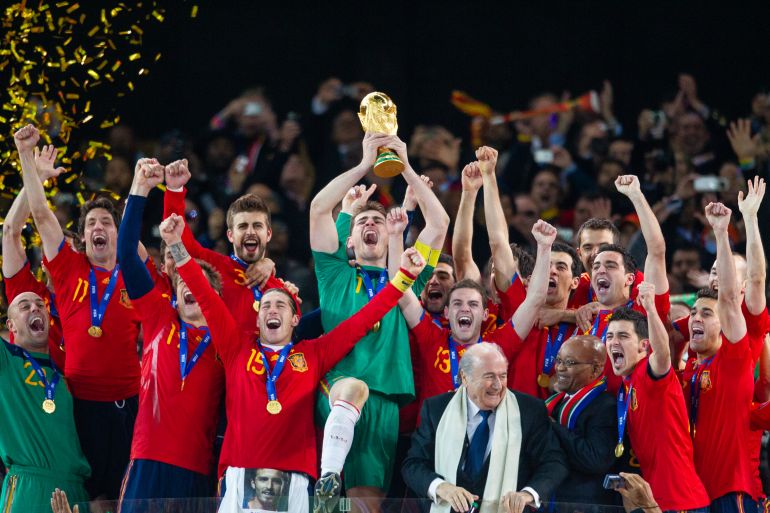World Cup 2010: When football’s biggest party arrived in Africa
In the 2015 FIFA corruption case, it emerged that the bidding process was corrupted by paying bribes to then-FIFA official Chuck Blazer.

Host: South Africa
Teams: 32
Format: Group stage, knockouts
Matches: 64
Goals: 145
Winner: Spain
Runners-up: Netherlands
Golden Boot: Thomas Muller (Germany)
Background
The World Cup finally made its way to Africa after FIFA’s decision to move the tournament.
Keep reading
list of 4 itemsMan Utd win FA Cup semifinal thriller against Coventry on penalties
Manchester City vs Chelsea 1-0: FA Cup semifinal – as it happened
Brazil football legend Romario announces comeback at 58
Bids for the 2010 edition were open only to African countries and came from Egypt, Morocco, South Africa, and a joint bid from Libya and Tunisia.
Morocco, which has been bidding for some time, was to miss out by four votes as Nelson Mandela famously hoisted the trophy when South Africa was announced the winner of the bidding process.
In the 2015 FIFA corruption case, it emerged that the bidding process was corrupted by paying bribes to then-FIFA official Chuck Blazer.
France and Italy, finalists from the previous World Cup, failed to progress to the knockouts. It left Argentina, Brazil, Germany and Spain as the favourites.
Argentina, coached by Diego Maradona, were beaten 4-0 by Germany, while Brazil were knocked out Netherlands in the quarter-finals.
The final between Netherlands and Spain saw 14 yellow cards handed out amid some physically aggressive action, especially from the Dutch.
The match went into extra time after goalkeeper Iker Casillas saved a one-on-one attempt by Netherlands’ Arjen Robben.
Andres Iniesta, one of the several proponents of tiki-taka style of play, scored in the 115th minute to end Spain’s long wait for a World Cup.
The tournament saw the widespread use of vuvuzelas inside stadiums, and the trend caught on in other sports.
Highs
Africa hosted its first World Cup.
Mandela made an appearance during the closing ceremony.
Paul the octopus became a sensation after correctly predicting all matches involving Germany, and the final.
Colombian singer Shakira’s song Waka Waka (It’s Time for Africa) became one of the most famous World Cup songs.
Lows
The bidding process was found to be corrupt.
South Africa was eliminated after the group stage.
The World Cup ball Jabulani came under criticism from the players for its texture, which made its aerial path unpredictable.